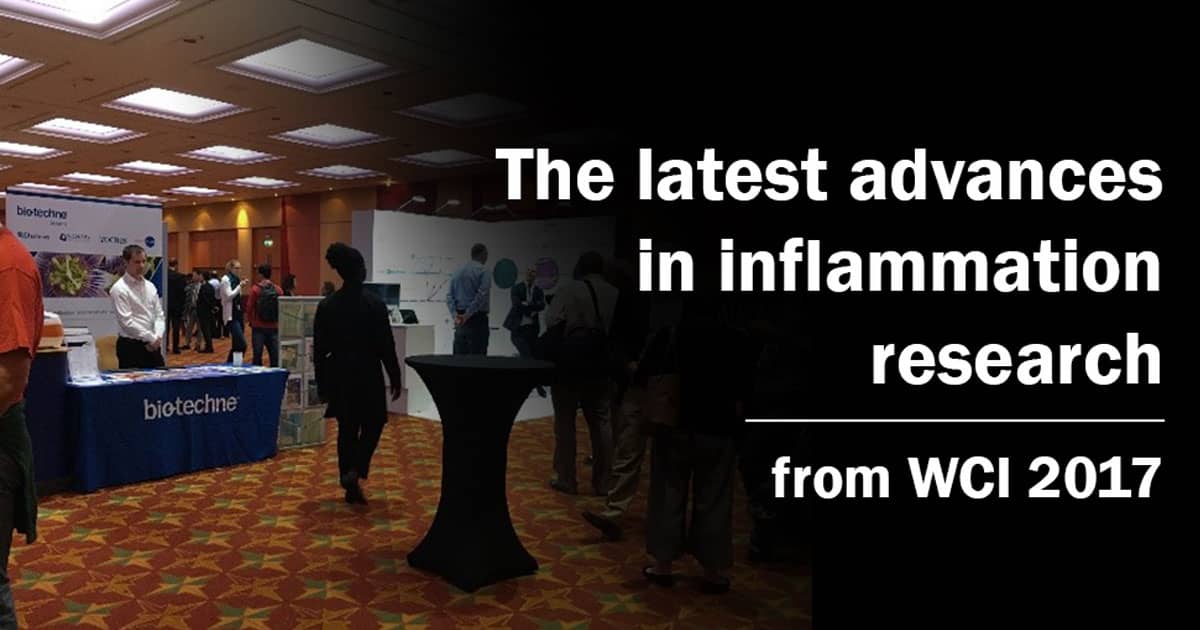The Latest Advances in Inflammation Research from WCI2017
The Latest Advances in Inflammation Research from WCI 2017
The World Congress on Inflammation (WCI 2017) is a prestigious biennial international conference that brings together scientists from around the world to discuss the latest developments in inflammation research. Bio-Techne attended this year’s exciting Congress from July 8th-12th organized by the British Inflammation Research Association (BIRAs). The plenary lectures were presented by leading researchers on topics ranging from inflammation in aging, neuroinflammation, innate immune memory, regulation of inflammation, microbiome and inflammatory bowel disease. Here are some highlights that we discovered from the meeting.
Inflammaging and SASP
Inflammaging was a popular topic about research into the effects of increased inflammation as an individual grows older. As we age, we accumulate senescent cells in our tissues, which can cause chronic inflammation through the senescence-associated secretory phenotype (SASP). Dr. Joao Passos from the University of Newcastle presented a talk that highlighted close links between mitochondria and cellular senescence, suggesting mitochondria should be further investigated as possible intracellular allies to combat cellular aging. Senescence was also a key aspect of the talk given by Dr. Lorna Harries from the University of Exeter who presented some intriguing research into the connection between splicing regulatory proteins and aging. From her presentation, we learned that certain cytokine compounds can be utilized to regulate splicing and restore cell proliferation in senescent cells.
Interactive Inflammatory Cytokine MAPK Signaling Pathway
Neutrophils As First Responders
Neutrophil involvement in inflammation was a recurring feature during the Congress. Dr. Elizabeth Sapey from the University of Birmingham discussed neutrophil dysfunction and the related effects on aging and chronic inflammatory disease. She discussed how statins improve neutrophil migration accuracy in the lungs of non-sepsis pneumonia patients. She suggested that immunomodulation may be an effective treatment option in infection and inflammation. Prof. Katja Simon from the Kennedy Institute of Rheumatology in Oxford presented data on the effects of autophagy on immune metabolism during neutrophil differentiation. She highlighted that the number of immature neutrophils increase in the absence of Atg5 and Atg7. She also discussed a novel flow cytometry assay used to separate neutrophil progenitors, which was used to show that granulocytes without autophagy remain immature.
Bio-Techne offers comprehensive flow cytometry workflow solutions for researchers. R&D Systems provides kits for cell selection and cell differentiation and antibodies for cell detection. Novus Biologicals also offers a useful flow cytometry panel builder tool to enable researchers to search for antibodies that will work with specific cytometers.
Modulation of Inflammation by Autophagy
The role of autophagy in inflammation was further discussed by Prof. Arthur Kaser from the University of Cambridge who presented data on the role of impaired autophagy in Crohn’s disease. The number of cases of Crohn’s disease and ulcerative colitis have been increasing since the 1930s, with the highest rates in the world being reported in the UK where around 1 in 100-150 people are affected. Prof. Kaser’s talk highlighted the genetic susceptibility to inflammatory bowel disease and links to environmental stress. He suggested that the impairment of autophagy in intestinal epithelial cells may predispose these cells to Crohn’s disease ileitis due to impaired clearance of large IRE1alpha clusters that form in Paneth cells experiencing high levels of stress in the endoplasmic reticulum.
Interactive Autophagy Signaling Pathway
Resolution of Inflammation and Repair
The symposia on resolution and repair also contained some engaging talks. Professor Mauri Teixeira from UFMG discussed the induction of resolution as a treatment of inflammation. He suggested that metabolic products such as angiotensin 1-7 and acetate may have profound effects on the inflammatory response by promoting the return of tissue to homeostasis. He also provided evidence that short chain fatty acids (SCFA) decrease inflammatory responses in tissues because they actively induce the resolution of inflammation. The importance of the topic of resolving inflammation was further highlighted by Prof. Marco Aurélio Martins from FIOCRUZ. He discussed the pro-resolution effect of 15-deoxy-Δ-12,14-prostaglandin J2 (15d-PGJ2) on allergen-induced lung inflammation and remodeling. This effect is associated with a decrease in lung tissue generation of pro-inflammatory cytokines by a mechanism related to the down-regulation of NF-κB.
A breaking news feature from the event was presented by Dr. John Langowski from Nektar Therapeutics, who publicly disclosed the launch of a clinical study on a first-in-class regulatory T cell stimulator clinical candidate, NKTR-358 that is currently being developed for the treatment of immune inflammatory disorders. You can view further information from his slides here.

Inflammation is an integral element of many diseases and so the World Congress on Inflammation is always a lively event that supports a diverse range of ideas and topics. It has been announced that the next World Congress on Inflammation (WCI 2019) will be hosted in Sydney, , Australia arranged by the International Association of Inflammation Societies (IAIS). We look forward to the future discoveries in inflammation research from similar distinguished researchers from across the globe.


